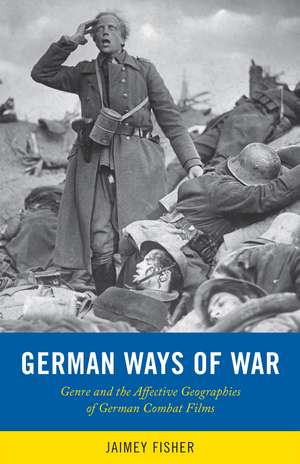German Ways of War: The Affective Geographies and Generic Transformations of German War Films: War Culture
Autor Jaimey Fisheren Limba Engleză Paperback – 12 aug 2022
Preț: 324.35 lei
Nou
Puncte Express: 487
Preț estimativ în valută:
62.06€ • 64.80$ • 51.37£
62.06€ • 64.80$ • 51.37£
Carte indisponibilă temporar
Doresc să fiu notificat când acest titlu va fi disponibil:
Se trimite...
Preluare comenzi: 021 569.72.76
Specificații
ISBN-13: 9781978829176
ISBN-10: 1978829175
Pagini: 250
Ilustrații: 41 b&w images
Dimensiuni: 156 x 235 x 18 mm
Greutate: 0 kg
Editura: Rutgers University Press
Colecția Rutgers University Press
Seria War Culture
ISBN-10: 1978829175
Pagini: 250
Ilustrații: 41 b&w images
Dimensiuni: 156 x 235 x 18 mm
Greutate: 0 kg
Editura: Rutgers University Press
Colecția Rutgers University Press
Seria War Culture
Notă biografică
JAIMEY FISHER is a professor of German and cinema and digital media at the University of California, Davis. He is the author of Treme, Christian Petzold and Disciplining Germany: Youth, Reeducation, and Reconstruction after the Second World War.
Cuprins
Acknowledgements
1. Introduction: The Affective Geographies and Generic Transformations of German War Films, 1910s-2000s
2. Land into Landscape, Landscape into Territory: Transformations of Space in German War Cinema, 1914-1918 (The Diary of Dr. Hart, Sword and Hearth, Inexpiable)
3. “Landscapes of Death” and Memories of the Human: Distance, Scale, and the Double Map in the First “War-Sound-Film” (Westfront 1918, Kameradschaft)
4. Combat Films and their Aerial Spaces under the Nazi Regime (Medal of Honor, Squadron Lützow, Above Everything in the World)
5. Out of the War Mode: Demobilizing the War Genre in the Postwar Rubble-Film (Request Concert [1940], The Great Love, Ways into Twilight, The Sons of Mr. Gaspary, Birds of Migration)
6. War in the Reconstructive 1950s: Genre, Espionage, and Cold-War Subjectivities in the 1950s War Film (Canaris, Fox of Paris, Rommel Calls Cairo)
7. Conclusion: Affective Geographies of the Fading Genre (Das Boot, Downfall)
Notes
Bibliography
Index
1. Introduction: The Affective Geographies and Generic Transformations of German War Films, 1910s-2000s
2. Land into Landscape, Landscape into Territory: Transformations of Space in German War Cinema, 1914-1918 (The Diary of Dr. Hart, Sword and Hearth, Inexpiable)
3. “Landscapes of Death” and Memories of the Human: Distance, Scale, and the Double Map in the First “War-Sound-Film” (Westfront 1918, Kameradschaft)
4. Combat Films and their Aerial Spaces under the Nazi Regime (Medal of Honor, Squadron Lützow, Above Everything in the World)
5. Out of the War Mode: Demobilizing the War Genre in the Postwar Rubble-Film (Request Concert [1940], The Great Love, Ways into Twilight, The Sons of Mr. Gaspary, Birds of Migration)
6. War in the Reconstructive 1950s: Genre, Espionage, and Cold-War Subjectivities in the 1950s War Film (Canaris, Fox of Paris, Rommel Calls Cairo)
7. Conclusion: Affective Geographies of the Fading Genre (Das Boot, Downfall)
Notes
Bibliography
Index
Recenzii
"German Ways of War is an engaging text that charts out a captivating genre history that extends far beyond its immediate scope of German War films. The book is written as a fascinating account to how warfare changed in the twentieth century. . . The project is meticulously researched and provides invaluable political, historical, and legal documentation regarding war and peace policies in Germany."
"This original study of exemplary German features probes essential dimensions of war cinema that have received little scholarly attention, its geopolitical determinations, spatial imaginaries, and affective geographies. A major contribution to film history and media studies, German Ways of War offers a comprehensive analysis of the numerous countenances and different functions this generic possibility has assumed in exemplary German productions from World War I to the postmillennial era.”
"Fills an important gap in cinema scholarship by examining German war films from the beginning of World War I through to the early 2000s. . . . Fisher's book is beneficial for film scholars and teachers, as it is dense with useful information about, and sophisticated close readings of, the selected German war films he considers. . . . Over time, the impact of Jaimey Fisher's impressive monograph will extend beyond German Studies to Cinema and Media Studies more generally, as well as to other crucial interdisciplinary fields such as Peace and Human Rights Studies that examine representations of war in art and the critical and popular responses to them."
Descriere
German Ways of War explores the production of novel spaces and evocation of new affects in the war-film genre between the 1910s and 2000s. Beyond the conventional pairing of visuality and violence, war films combine mobility, landscape, territory, scales, and topological networks into “affective geographies” that interweave narratively-generated affect, space, and political processes.















